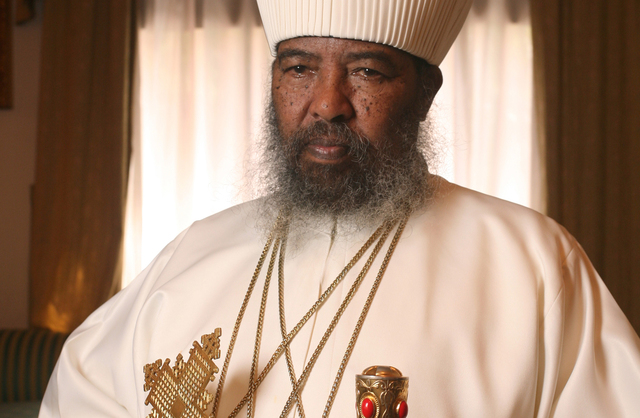The Unexpected Death of Abuna Paulos
Richard Marsh, Ph.D.
CEO, Institute for Food, Brain and Behaviour
24/8/2012
The unexpected death of Abuna Paulos, Patriarch of the Ethiopian Orthodox Tewahado Church, on the 16th of August at the age of 76 ushers in a period of uncertainty for Ethiopian Orthodox Christians. His death, together with that of Ethiopian Prime Minister, Meles Zenawi, four days later means that Ethiopia is without two of the key figures who have influenced its growth and development since the fall of the regime of Mengistu Haile Mariam in 1991.
Abuna Paulos, like Meles Zenawi, was born in the Northern Province of Tigray. His home was near Adwa, site of the famous rout of the Italian forces in 1896 and entered a local monastery as a young boy. He was ordained deacon and was later professed as a monk and ordained priest. Clearly intellectually talented, he was sent to study, first in Addis Ababa then in the United States at St Vladimir’s Theological Seminary before beginning doctoral studies at Princeton.
In Ethiopia Emperor Haile Selassie had been toppled and the Marxist Derg regime of Mengistu Haile Mariam had come to power. Abuna Paulos was summoned back to Ethiopia and consecrated bishop. The Church no longer enjoyed its privileged position, much of its land was confiscated and the Patriarch, Tewophilos, was arrested in 1976 and executed three years later. Abuna Paulos, too, was arrested and imprisoned together with four other bishops until 1983.
Following his release he returned to complete his doctoral studies at Princeton but during his exile worked with the expatriate Ethiopian community in the United States. The Derg regime appointed Abuna Tekle Haymanot to replace the executed Tewophilos and, when he died in 1988, Abuna Merkorios who had close ties to the government.
The regime fell in 1991, and Mengistu went into exile in Zimbabwe. Opinions vary as to whether Abuna Merkorios abdicated or was forced from office by the incoming EPRDF government. Either way, he and his supporters left for the United States and the Holy Synod elected Abuna Paulos, newly returned from the United States, as Patriarch.
Questions about the legitimacy of his election were significant in the early years of his service as Patriarch although throughout his patriarchate he was rarely without controversy and often the cause of vocal opposition. Visiting the Ethiopian Community in London in 1993, those remaining loyal to his predecessor clashed violently with his supporters in their Church in the fashionable area of Mayfair. He was judged by many as being too close to the new political leader of Ethiopia, Meles Zenawi, and too swift to favour Tigrayans over Ethiopians from other regions or linguistic groups particularly those from the Amhara region.
In the years following his election, much of the Church property, confiscated under the Derg, was returned and he was able to re-open the Theological Seminary in Addis Ababa. Once again he courted controversy by rebuilding the Patriarchal Palace in what was seen by many as being an overly grandiose style for a poor country in the Global South.
Passionate about Ethiopia, devoted to his Church with its unique history, spirituality and traditions, Abuna Paulos faced the challenge of rebuilding it after the grim days of the Marxist regime. He accomplished this with energy and skill. Some observers have noted that he stood intellectually head and shoulders above many of the other leaders of the Church. Convinced that Christianity had an important role to play in tackling social and economic issues, he took an active role in engaging the Ethiopian Orthodox Church in the fight against HIV/AIDS and guided reform and growth within the Church’s own development agency.
He was active on the world ecumenical stage, serving as one of the Presidents of the World Council of Churches and regularly attending the gatherings of the Rome-based Community of San’Egidio. A long-running rift with the Egyptian Coptic Church which had granted the Ethiopian Orthodox Church autocephaly or independence in 1948, was brought to an end in 2007.
On a personal level he was warm and softly spoken with an ironic sense of humour. Keen to share the richness of his Church and the beauty of Ethiopia, he would often tell his overseas visitors, ‘Why don’t you go and see for yourself?” Despite his many critics, he elicited displays of real love from the thousands who attended services over which he presided. He leaves a great gap in the leadership of his Church and a complex legacy for his successor.


8823 171622Hello, Neat post. There is an concern along with your site in internet explorer, could test thisK IE still could be the marketplace leader and a huge portion of other men and women will miss your magnificent writing because of this difficulty. 532625